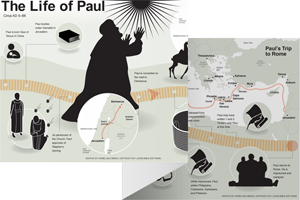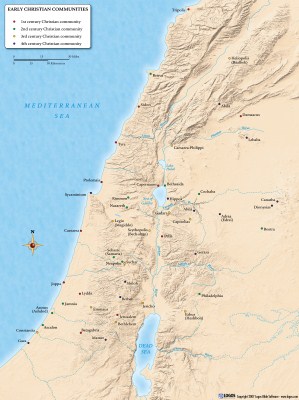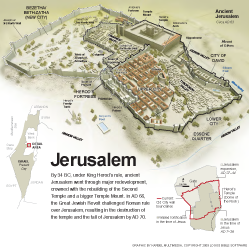21:1–16 Paul’s journey back to Jerusalem demonstrates the balance of his ministry. While recent chapters emphasized his work among Gentiles, his ministry in a location regularly began with his fellow Jewish people and now he desires to return to Jerusalem to report on his work (Acts 20:16). His priority is to unite Jew and Gentile in their faith in Christ. |
21:2 crossing over to Phoenicia A journey of more than 400 miles. Such a voyage would have taken three to five days.
21:3 Cyprus Paul has ministered in Cyprus before. Compare 11:19 and note.
21:4 telling Paul through the Spirit Paul has already been commanded by the Holy Spirit to go to Jerusalem (20:22). Rather than the Spirit giving contradictory messages, it may be that the believers know through the Spirit what will happen to Paul in Jerusalem, and they then worry about the dangers facing Paul there. Paul is ready to suffer for the gospel, but they do not want him to.
21:7 at Ptolemais A city on the southern Phoenician coast. In the ot the city was known as Acco (Judg 1:31).
21:8 Caesarea A major seaport for Israel, constructed by Herod the Great.
for Israel, constructed by Herod the Great.
one of the seven Philip was one of those whom God used initially to advance the gospel beyond the Jews to the Gentiles (Acts 6:1–7). He ministered to the Ethiopian eunuch (8:26–40).
21:9 daughters Joel 2:28–32 proclaims the coming of the Holy Spirit on both men and women, and Peter cites this prophecy in Acts 2:17–18. Paul’s first letter to the Corinthian church indicates that at least some women there prophesied (1 Cor 11:5).
21:10 Agabus See Acts 11:28.
21:11 Agabus’ proclamation of a capture by the Jews and arrest by the Gentile authorities indicates a more serious situation than Paul has experienced thus far. The Jewish leadership has far greater power in Jerusalem, and the Gentile (non-Jewish) authorities are more likely to listen to their accusations there. |
21:16 the disciples from Caesarea These probably included some Jews but also Hellenists or Gentiles.
Mnason Being from a predominantly Gentile area, Mnason was likely someone who would be understanding of the predominately non-Jewish group accompanying Paul.
21:17–28:31 While it is not usually counted among Paul’s missionary journeys, the remainder of the book of Acts narrates how Paul is enabled to take the gospel to Rome. First he is arrested in Jerusalem (21:17–23:35). Then he is transferred to Caesarea where, after a period of imprisonment, he appeals for his case to be heard by Caesar (24:1–26:32). Finally, he makes the difficult journey by ship to the center of the empire and is able to preach there (27:1–28:31). |
21:17–26 Paul and his colleagues visit Jerusalem to report on their work among the predominately Gentile (non-Jewish) regions. |
21:17 we came to Jerusalem Luke (the narrator) includes himself in his narrative. See note on 16:10.
21:18 James Brother of Jesus and leader of the church in Jerusalem (15:13).
21:21 abandonment of Moses Some Jewish people in Jerusalem believed incorrectly that Paul was discouraging Jews from keeping the law. This was not true, since Paul himself continued to observe Jewish customs (see 16:3; 18:18; 1 Cor 7:18–19).
21:23 a vow Likely a Nazirite vow (Num 6:1–21).
21:24 purify yourself A Nazirite vow was connected with becoming pure or holy before Yahweh for a set period of time (Num 6:5, 8). James may be suggesting that Paul join in the Nazirite vow himself—which he may have already voluntarily done at one point (see Acts 18:18 and note)—or that Paul undergo a different kind of purification rite (e.g., Num 19:12). By doing this, Paul will show that he is still sensitive to Jewish culture, which James believes will overturn their fellow Jews’ concerns about Paul. This action demonstrates that Paul is not encouraging Jews to abandon their traditions, cultural identity, or religious identity.
21:25 James affirms the decision of the Jerusalem Council (Acts 15:19). Paul’s actions are purely social, showing respect for Israelite customs. |
21:27–36 Paul is falsely accused of bringing Gentiles (non-Jewish people) into the parts of the temple they were not allowed in. |
21:27 the seven days Purification rites affiliated with the Nazirite vow took about seven days to complete (see Num 6:9; compare note on Acts 21:24).
from Asia The Jews from this province—which is roughly equivalent to modern Turkey and northern Greece—recognize Paul from his missionary journeys. They stir up the crowd to oppose him.
21:28 is teaching The Greek text here implies habitual or continual practice. The leaders are making an accusation about Paul’s ministry in general.
Greeks The Jews cite further supposed evidence of Paul’s apostasy. This action would have violated the sanctity of the temple and thus likely would have been understood as carrying the death penalty.
21:29 Trophimus Trophimus is a Gentile from Ephesus (in modern Turkey) and like the accusers of Paul, he is from the Roman province of Asia (20:4; compare v. 27 and note). Compare 2 Tim 4:20.
21:30 the whole city Paul is perceived to have violated the sanctity of the temple, and the Jews are determined to kill him.
21:31 the cohort The Greek text here uses terminology that indicates that the Roman commander is over about 1,000 soldiers.
in confusion Such unrest could actually be a crime in the eyes of Roman officials (compare Acts 19:32–40). The soldiers were forced to act to keep the peace.
21:32 the military tribune This officer’s presence saves Paul’s life. His name is given later as Claudius Lysias (23:26).
21:34 the crowd were shouting The violent outcries of the crowd show potential for a riot (compare 19:32).
21:37–22:5 Paul takes advantage of his Roman citizenship to testify to the crowd. |
21:37 Do you know Greek Paul’s knowledge of Greek would indicate he was well educated.
21:38 the Egyptian The officer confuses Paul with someone else. The Jewish historian Josephus records the exploits of this Egyptian rebel (Josephus, Antiquities 20.169–72).
Assassins The Greek word used here, sicarios, refers to a violent anti-Roman Jewish revolutionary group.
 Major Groups in Jesus’ Time Table
Major Groups in Jesus’ Time Table
21:39 no unimportant city Paul uses this rhetoric to emphasize that Tarsus was a city known for scholarship and culture. Paul’s citizenship and the identity of his hometown show that he is not a rebel as the officer in charge may have thought.
21:40 Aramaic language The Greek term used here, hebrais, can refer in the nt to either Hebrew or Aramaic. Aramaic is probably meant here, since it was the more common spoken language at the time. Paul’s use of it demonstrates to those present that he is a Jew and respects their culture.

|
About Faithlife Study BibleFaithlife Study Bible (FSB) is your guide to the ancient world of the Old and New Testaments, with study notes and articles that draw from a wide range of academic research. FSB helps you learn how to think about interpretation methods and issues so that you can gain a deeper understanding of the text. |
| Copyright |
Copyright 2012 Logos Bible Software. |
| Support Info | fsb |
 Loading…
Loading…



